“No, you’re not going to school’: Why more Qld parents are keeping their kids at home
Homeschooling is on the rise, with parents and experts blaming a packed curriculum and an indoor-focused, structured education system for the shift. They say their kids learn best through play.
News
Don't miss out on the headlines from News. Followed categories will be added to My News.
In Bodhi and Sloane Sikkema’s world, it’s all about learning through play.
When four million children return to the classroom this month for term one, the nine and seven-year-old will head to the beach.
After that they’ll try to catch yabbies in the creek, and then they’ll feed the horses.
At some point the siblings will dedicate just 20 minutes to book work.
Mum Sam Lycett, 45, began the family’s homeschool journey four years ago, which saw Bodhi pulled out of mainstream school after a year of kindergarten.
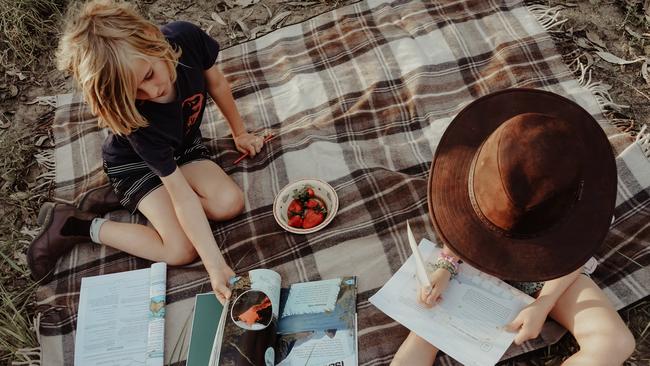
“Homeschooling just fits in so well with our life. It’s a lifestyle choice,” Lycett says.
And at the moment that lifestyle sees the family of four living on a farm in Coffs Harbour. Before that they were driving across Australia. Next up will be a six-month sojourn in Bali.
And after that? Well, your guess is as good as theirs. “A lot of people don’t understand how much kids can learn just from being out and about in the world. Our kids are so curious and interested in learning,” Lycett explains.
“We want our kids to be lifelong learners. We don’t want cookie-cutter kids, like myself and everyone else, who were just sent off to school and taught the same way.”
Bodhi and Sloane are part of a growing cohort of homeschooled kids, with more than 43,000 children registered for homeschooling in Australia in 2022. That is up from 10,880 a decade before. But that number is believed to be even higher with many families choosing to stay off the official grid and not registering their children as students in official figures.
While once seen as alternative, homeschooling is becoming increasingly popular for families from all walks of life.
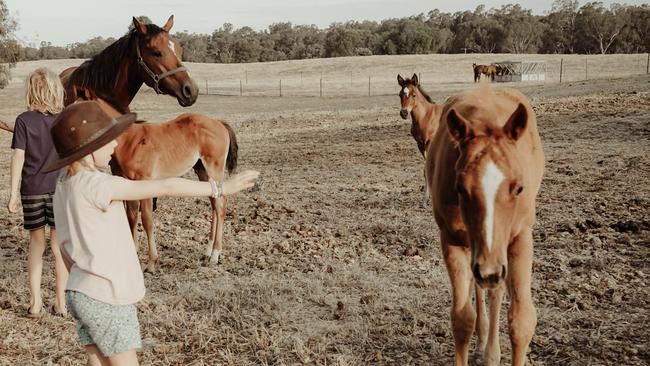
In Queensland, Education Department data shows 10,048 children were registered for homeschooling in 2023, a huge surge from the 1108 kids enrolled a decade ago. In South Australia, there are 2443 registered homeschoolers and 11,912 in Victoria. NSW has the highest number of registered homeschooled students in the country with almost 12,500.
The Low family in Bargo, NSW, is part of that group. Pediatric occupational therapist Jessica Low, 35, and her husband, researcher Dr Mitchell Low, 35, have five children and have never sent them to school.
“The biggest factor for me is child development,” Jessica Low says, drawing on her experience gained over the past nine years she has spent working as an OT.
“Just physically they don’t even have the proper core strength to sit at desks for long periods in early childhood.
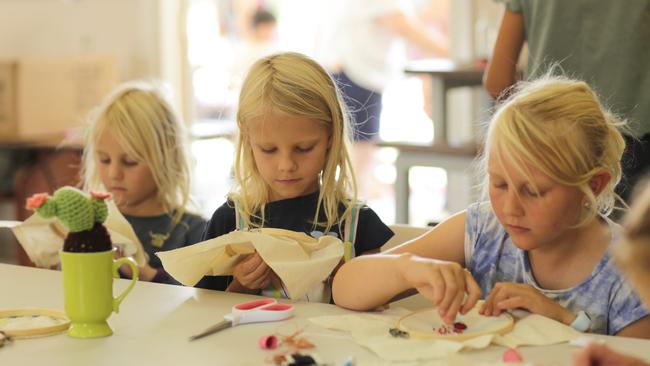
“That’s why you see kids flopped over with their head in their hands.
“And they’re not even allowed to sensory regulate themselves because if they start wriggling and fidgeting, they’re told to stop.”
Low says her oldest children – Penelope, 9, Josie, 7 and John, 6 – are thriving at home, and so too is their family.
“If my kids were in school we would have such little connection,” Low says, noting that learning begins from the moment they wake up.
“A big part of our day is breakfast. They all have jobs, one clears the table, one does the dishwasher. It’s learning to work as a team, learning to communicate with one another.
“There are sibling fights which they may need guidance to resolve. These are important skills for them to learn.”
Home education looks different for every family, shaped by each state’s regulations.
Generally, children are expected to meet outcomes that are in line with their schooled peers. For example, the Low family follows the NSW syllabus and is checked by a moderator at least once a year.
But Low says she adapts everything so they are learning through play, adding: “Kids just need to spend time playing, running, jumping, climbing trees.”
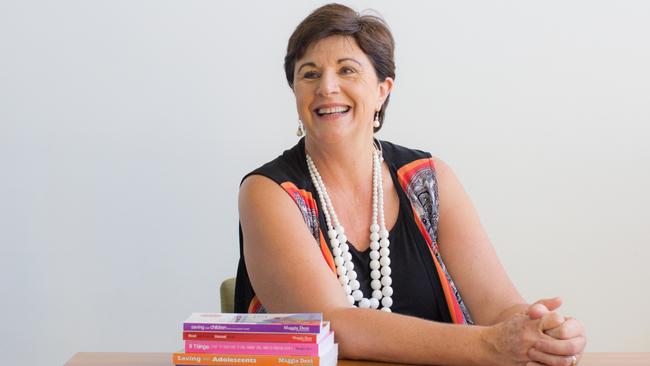
Educator and parenting specialist Maggie Dent, 68, echoes this sentiment. She’s spent much of her life’s work advocating for kids to spend less time at desks and more time playing, particularly in the formative years.
“Our children aren’t moving enough. And the lack of movement impacts the way the brain is shaped,” Dent explains.
“Children as young as five are doing a lot more sitting on mats and at desks than they used to.”
Dent says Australia’s education results “have crashed” over the past 20 years when compared with other countries.
She cites Finland as a positive example of where children are assessed not just on a curriculum but with a focus on social and emotional intelligence.
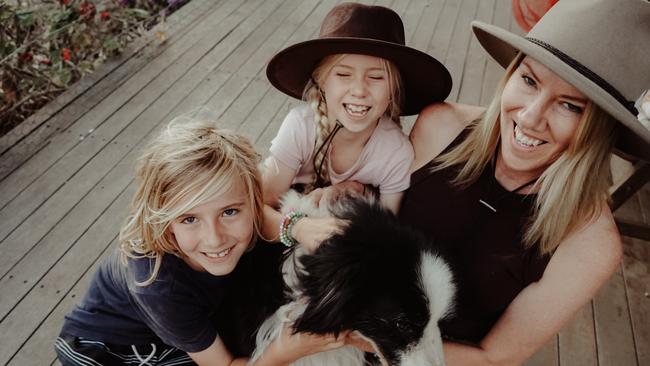
The Organisation for Economic Co-operation and Development measures the education standards of 41 participating countries through its Program for International Student Assessment. Finland ranks fourth in the PISA, while Estonia is the highest performing OECD country. In those two countries children don’t start compulsory schooling until the age of seven.
Australian children are strapping on their backpacks and heading into compulsory schooling at age five, resulting in a rank of 17.
“There is no evidence that starting earlier gets better results. In actual fact we see just the opposite. Teachers are telling me all the time that the curriculum is so crowded, and they have to so do much more assessment that it’s taken the joy and fun out of teaching,” Dent says.
“So what happens is children start to hate learning, they start to lose their curiosity and they start really struggling in social environments because there aren’t enough play opportunities.”
Dispelling the myth of social isolation, homeschooling programs such as the We Are Nature Network in Perth, Western Australia, provide a nature-based classroom for children aged four to seven. It’s run by teachers who’ve left the education system.

On the day I visit, co-founder Emily Patterson starts the morning by reading The Troll, by Julia Donaldson, on a picnic rug under a tree. There are 10 pairs of eyes watching intently.
Some of the kids are sitting on their parents’ laps, others are eating from their lunch box. Nearby three little boys who are climbing a tree turn to look and listen every now and then.
Another boy hops up from the rug and picks up a stick he’s found lying nearby. He starts tapping the stick on the dirt. No one seems to notice, they’re all too engrossed in the story, including the little boy with the stick. He’s listening to every word Patterson reads.
At one point a golden retriever being walked off its leash comes past and story time quickly turns into a collective dog patting session.
“A huge value of mine is being outdoors and playing,” Patterson, 31, says.
The mother-of-three left her job as a primary school teacher when she had her first son, Taj, seven years ago, and hasn’t looked back.
“I thought, I’ll create something that feels right for my family, but also where other kids can come and feel good about learning.”

There is limited research on the academic outcomes of homeschooling because many parents choose for their children not to sit exams. A 2014 NSW government report found homeschooled children who participated in the NAPLAN tests scored “significantly above the overall NSW average”, but noted just 10 per cent of homeschooled children took the tests.
“There is such a focus on academics at school, but you can learn to read and write at 90. You can learn anything at any age. The first seven years of life are absolutely critical to social and emotional development. You can’t get that time back,” Patterson says.
For some families homeschooling is something they never thought they’d do, but made the decision based on issues like bullying, mental health and a lack of support for neurodivergent children.
“We don’t factor neurodivergent kids and their unique needs into teaching environments at all,” Dent says.
“Many parents are asking why would I put them into a system that is ‘one size fits all’, when I can keep them home and still be doing all the things that help them learn.”

Just like school, homeschooling isn’t for everyone. It does involve sacrifices with some families having to weigh up the financial burden of having one parent give up employment, typically the mother, to stay home.
And while all the mothers I interviewed have managed to continue working flexibly around their children’s education, they do all agree on one downside: the scarcity of personal time. Nevertheless, it’s a compromise willingly embraced.
“That’s probably the only thing because I’m with them all day,” Lycett reflects. “So at night time, I need a little bit of time to myself. But other than that, they are great kids, we love being with them.”
And what if their kids want to go to school one day? “If they ever want to go to school, they can,” she says.
Patterson agrees: “I’m totally open to it.”
But Low is sticking by her beliefs: “Just like I can say ‘you can’t have ice cream for breakfast’, I can also say ‘no, you’re not going to school’.”
Originally published as “No, you’re not going to school’: Why more Qld parents are keeping their kids at home




